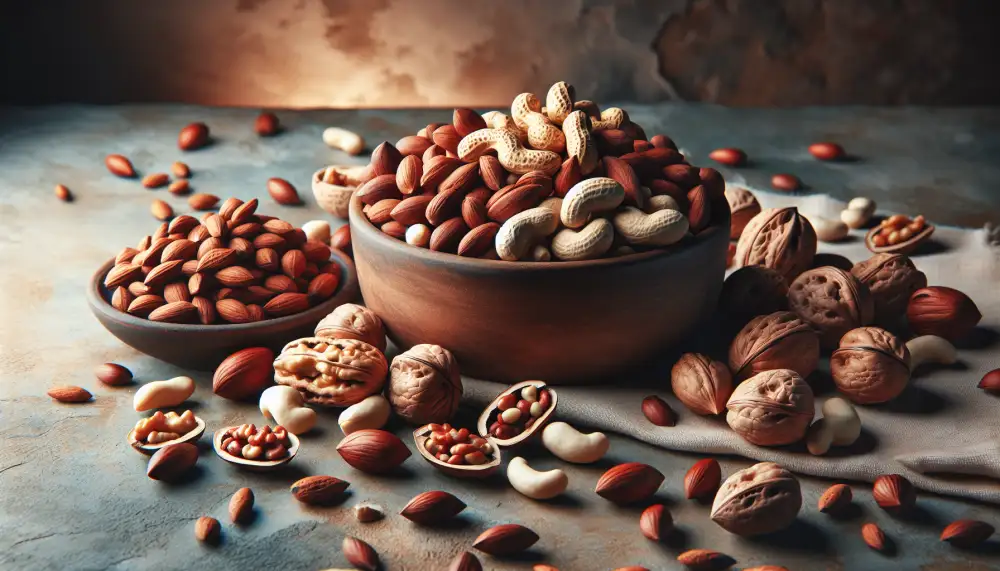Skinny Nuts: Your Secret Weapon for a Healthier Heart

Skinny Nuts: Fact or Fiction?
The idea of "skinny nuts" is a bit misleading. Nuts are naturally nutrient-rich powerhouses, packed with healthy fats, protein, fiber, and essential vitamins and minerals. The term "skinny" might make you think you can eat unlimited amounts without consequences, but that's not true for any food.
While nuts don't necessarily need a "low-fat" makeover, you can be mindful of portion sizes. A standard serving of nuts is about a small handful or 1 ounce. Sticking to this amount allows you to enjoy the nutritional benefits of nuts without overdoing the calories.
Remember, it's always a good idea to choose unsalted or lightly salted nuts to keep your sodium intake in check. And, as with any food, balance and moderation are key to a healthy diet.
Fat Content in Popular Nuts
While nuts are celebrated for their nutritional benefits, those watching their fat intake might wonder where different nuts stand. The term "skinny nuts" isn't an official designation, but it's often used colloquially to refer to nuts naturally lower in fat compared to their counterparts.
Almonds, often perceived as diet-friendly, contain around 15 grams of fat per ounce, with a significant portion being heart-healthy monounsaturated fat. Cashews, with their creamy texture, come in slightly higher at around 16 grams of fat per ounce.
On the lower end of the fat spectrum, we find walnuts, packing about 18 grams of fat per ounce, but they boast a higher concentration of omega-3 fatty acids, beneficial for brain and heart health. Pistachios, known for their satisfying crunch, contain around 15 grams of fat per ounce.
Remember, while some nuts might be naturally lower in fat, portion control remains key for overall health and weight management.
Health Benefits of Unsalted Nuts
Unsalted nuts, often referred to as "skinny nuts" due to their naturally low-fat content, offer a wide array of health benefits. Packed with essential nutrients, these nuts can be a delicious and guilt-free snack option.
Unsalted nuts are rich in monounsaturated and polyunsaturated fats, which can help lower bad cholesterol levels and reduce the risk of heart disease. They are also excellent sources of fiber, which aids digestion and promotes satiety, making you feel fuller for longer and potentially assisting in weight management.
Moreover, unsalted nuts are packed with vitamins and minerals, including vitamin E, magnesium, and potassium. Vitamin E is a powerful antioxidant that protects cells from damage, while magnesium plays a crucial role in muscle function and blood sugar control. Potassium, on the other hand, is essential for maintaining healthy blood pressure levels.
Incorporating a handful of unsalted nuts into your daily diet can provide numerous health benefits. Whether you prefer almonds, walnuts, or cashews, make sure to choose unsalted varieties to avoid excess sodium intake.

Impact on Heart Health
Low-fat nuts, often dubbed "skinny nuts," can be a heart-healthy snack choice. These nuts are naturally lower in fat and calories compared to some of their fattier counterparts, but they are still packed with nutrients that benefit cardiovascular health. For example, almonds, a popular skinny nut, are rich in monounsaturated fats, which can help lower bad cholesterol levels (LDL cholesterol) and raise good cholesterol levels (HDL cholesterol). This balance is crucial in preventing plaque buildup in arteries, reducing the risk of heart disease.
Furthermore, many low-fat nuts are good sources of fiber, another nutrient that plays a significant role in heart health. Fiber aids in digestion and can help regulate blood sugar levels, which is beneficial for managing weight and reducing the risk of type 2 diabetes, a condition often linked to heart problems. Additionally, skinny nuts provide essential minerals like magnesium and potassium, both of which contribute to healthy blood pressure regulation. Maintaining healthy blood pressure is crucial in preventing strain on the heart and reducing the risk of stroke.
Nuts and Weight Management
While nuts are packed with nutrients and healthy fats, they can be calorie-dense, leading some to believe they hinder weight loss. However, the idea of "skinny nuts" or "low-fat nuts" is a bit of a misnomer. All nuts contain fat, which is part of what makes them so satiating and beneficial for health.
The key is moderation and choosing nuts that are slightly lower in calories and fat per serving, such as almonds, cashews, and pistachios. These nuts can be incorporated into a balanced diet to support weight management.
The fiber and protein in nuts contribute to feelings of fullness, which can help control overall calorie intake. Additionally, the healthy fats in nuts, including monounsaturated and polyunsaturated fats, have been linked to improved insulin sensitivity and metabolism.
Instead of fearing nuts, embrace them as part of a balanced approach to weight management. Enjoy a small handful as a snack, sprinkle them on salads, or incorporate them into healthy recipes. Remember, portion control is key, and enjoying a variety of foods is always recommended for optimal health.
Choosing the Right Nuts
When searching for a healthy and satisfying snack, nuts are a great option. But some nuts are higher in fat and calories than others. If you are looking for a "skinny nut" option, there are a few things to keep in mind.
First, consider the fat content. While nuts are generally healthy fats, some varieties are naturally lower in fat than others. Look for nuts like cashews, almonds, and pistachios, which tend to have a lower fat content per serving compared to options like macadamia nuts or walnuts.

Second, pay attention to portion size. Even "skinny nuts" can contribute to weight gain if you eat too many. A standard serving size for nuts is typically a small handful, about 1 ounce or 28 grams.
Finally, don't be afraid to experiment with different types of nuts to find your favorites. Each nut variety offers a unique flavor and nutrient profile.
Portion Control is Key
Skinny nuts? Not quite! While nuts are packed with healthy fats, fiber, and protein, they're also calorie-dense. This means that a small serving can pack a surprising calorie punch. That's where portion control comes in. Think of nuts as a treat to be enjoyed in moderation, not something to munch on mindlessly.
A standard serving size for nuts is typically a small handful or about 1 ounce. It's easy to overindulge without realizing it, so try pre-portioning your nuts into snack bags or using measuring cups and spoons to stay on track. You can also try incorporating nuts into your meals in creative ways, like sprinkling them on salads, yogurt, or oatmeal, to add flavor and nutrition without going overboard on calories. Remember, a little mindfulness goes a long way in enjoying the benefits of nuts while keeping your calorie intake in check.
Potential Risks and Allergies
While nuts are generally considered a healthy snack, it's important to be aware of potential risks and allergies, especially when it comes to the term "skinny nuts" or low-fat nuts.
| Nut Type | Calories per Serving (28g) | Fat per Serving (28g) | Considered "Skinny"? |
|---|---|---|---|
| Almonds | 160-170 | 14-15g | Not particularly |
| Walnuts | 180-190 | 18-19g | No |
| Cashews | 150-160 | 12-13g | Could be argued |
Firstly, the term "skinny nuts" can be misleading. Nuts are naturally energy-dense foods, meaning they are relatively high in calories and fat. While some nuts may have slightly lower fat content than others, they are not a low-calorie food. Consuming large quantities of nuts, even those marketed as "skinny," can contribute to weight gain if calorie intake is not balanced.
Secondly, individuals with nut allergies need to be extremely cautious. Nut allergies are among the most common food allergies, and they can cause severe, life-threatening reactions. It's crucial to read food labels carefully, as even small amounts of nut protein can trigger an allergic reaction. Cross-contamination during processing is also a concern, so individuals with severe allergies should be aware of the manufacturing practices of the brands they consume.

Lastly, some individuals may experience digestive discomfort after consuming nuts. Nuts are high in fiber, which is beneficial for digestion but can cause bloating, gas, and stomach cramps in some people, especially if consumed in large quantities.
Nuts as Part of a Diet
Nuts are nutritional powerhouses, offering a satisfying crunch along with healthy fats, protein, fiber, and essential vitamins and minerals. However, their relatively high-calorie content often makes people hesitant to include them in their diet, especially those aiming to lose or maintain weight. This is where the concept of "skinny nuts" comes in.
While there's no official category for "skinny nuts," it's a catchy term referring to nut varieties naturally lower in calories and fat compared to their counterparts. These nuts can be enjoyed more liberally without derailing your health goals. Some popular examples include chestnuts, almonds, and pistachios.
Chestnuts are unique in the nut world, boasting a significantly lower fat content and a higher carbohydrate profile, resembling grains more closely. This makes them a lighter option, perfect for roasting or incorporating into savory dishes. Almonds, a popular choice for their versatility and satisfying crunch, are relatively low in calories and rich in fiber and protein, contributing to feelings of fullness and aiding in weight management. Pistachios, enjoyed in their shells, offer a mindful eating experience. The act of shelling each nut can slow down consumption, and their vibrant green color adds a visual appeal to any snack or meal.
Remember, portion control remains key even with "skinny nuts." While they offer a healthier way to enjoy these crunchy treats, overconsumption can still contribute to excess calorie intake. Aim for the recommended serving size, typically a small handful, to reap their nutritional benefits without sabotaging your health goals.
Consult a Nutritionist
If you're concerned about your weight or simply want to make healthier snack choices, talking to a registered dietitian or a qualified nutritionist can be incredibly beneficial. These experts can provide personalized guidance based on your individual needs and goals. They can help you understand the role of nuts in a balanced diet and how to incorporate them appropriately.
A nutritionist can also address any concerns about "skinny nuts" or low-fat nut options. While some nuts naturally contain slightly fewer calories and fat than others, it's important to remember that all nuts offer valuable nutrients. A nutritionist can help you differentiate between marketing hype and genuine health benefits. They can guide you towards making informed choices that align with your overall dietary needs and preferences.

Published: 02. 07. 2024
Category: Food



